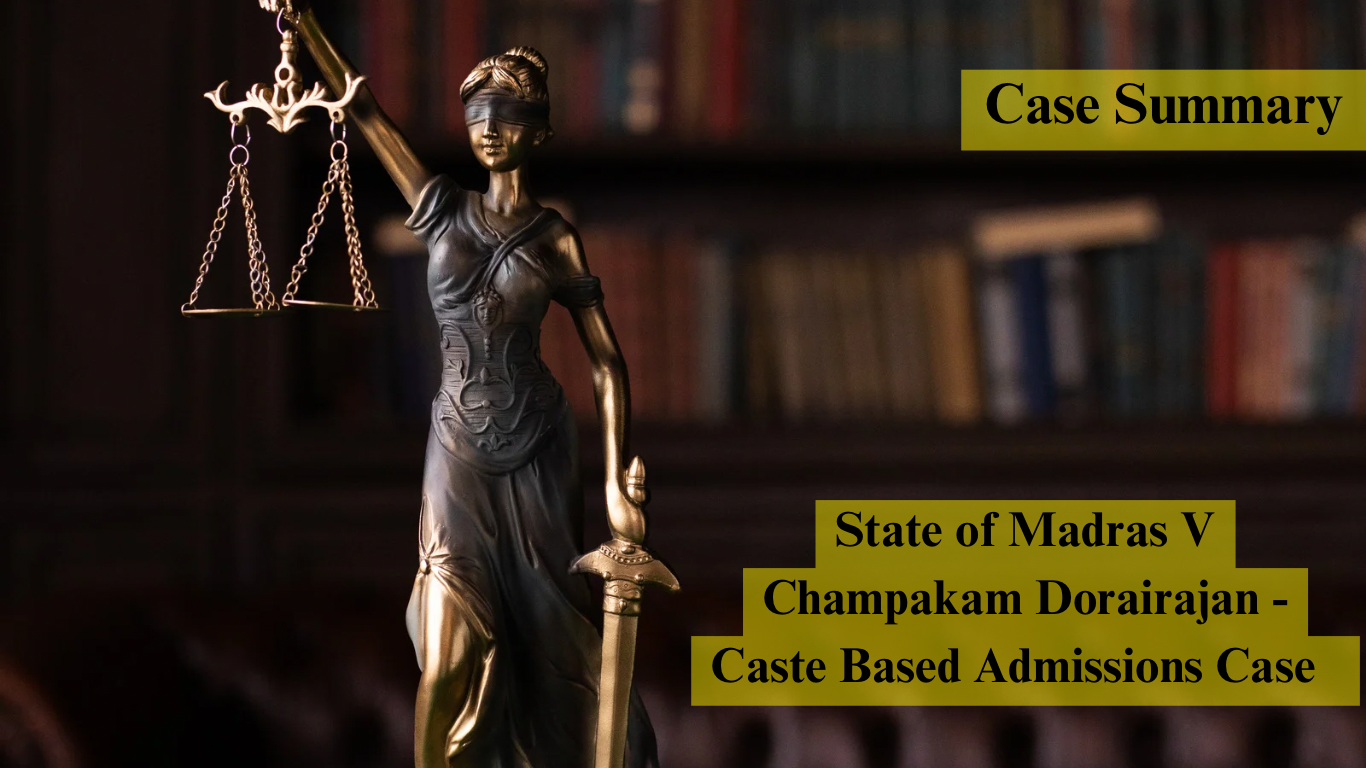
State of Madras V Champakam Dorairajan
AIR 1951 SC 226 : (1951) 2 SCR 525
Brief
Citation : AIR 1951 SC 226 : (1951) 2 SCR 525
Court : The Supreme Court of India
Date of Decision : 9 April 1951
Judges : MH Kania CJ, S Fazal Ali, MC Mahajan, BK Mukherjea, M Patanjali Sastri, Vivian Bose and SR Das, JJ
Facts
Smt Champakam Dorairajan made an application to the Hon’ble High Court of Judicature at Madras under Article 226 for the protection of her fundamental rights under Article 15(1) and Article 29(2). She prayed for the issue of a Writ of Mandamus or any other suitable prerogative writ restraining the State of Madras, officers as well as subordinates from enforcing, maintaining, observing, following or requiring the enforcement, observance, maintenance or following by the authorities concerned of the notification or order which is generally referred to as the communal G.O (Government Order).
By which admissions into the Madras Medical Colleges were sought or purported to be regulated in such a manner as to infringe and involve the violation of her fundamental rights. The affidavit which was filed in the support of her petition did not appear to show case that the petitioner had actually applied for admission in the medical college. Champakam Dorairajan stated that on enquiry she came to the knowledge that she would not be admitted to the college as she belonged to the Brahmin community.
There was no objection taken towards the maintainability of Champakam Dorairajans petition on the ground of absence of any actual application for admission made by her. On the other hand, the state had agreed to reserve a seat for Champakam Dorairajan, should her application before the High Court succeed. Under this circumstance, the court did not consider it necessary to pursue this matter further.
Though it sought to guard itself against being understood as holding that it approves of a person who has not applied for admission into an educational institution coming to court complaining of infringement of any fundamental rights under Article 29(2) of the Constitution of India.
Issue
The petitioner Champakam Dorairajan argued that the communal G.O was violative of Article 15(1) and Article 29(2) and violated her fundamental rights which are guaranteed by the Constitution of India.
Judgement
Part III of the Constitution under it mentions Article 29 under the head Cultural and Educational Rights and it states as follows under it.
- Any section of the citizens residing in the territory of India or any part thereof having a distinct language, script or culture of its own shall have the right to conserve the same.
- No citizen shall be denied admission into any educational institution maintained by the state or receiving aid out of state funds on grounds only of religion, race, caste, language or any of them.
Whilst Article 29 clause (1) protects the language, script or culture of a section of the citizens, Article 29 clause (2) guarantees the fundamental right of an individual citizen. Clause (2) in it mentions the right to get admission into any educational institution, this is a right which an individual citizen has as a citizen and not as a member of any community or class of citizens.
This very right is not to be denied to the citizens on the grounds only of religion, race, caste, language or any of them. A citizen who seeks admission into any such educational institution has not the requisite academic qualifications and is denied admission on that very ground. Hence, such a citizen certainly cannot be heard to complain of an violation of their fundamental right under this article. On the contrary, if the citizen has the academic qualifications but is refused admission only on the grounds of religion, race, caste, language or any of them then there is a clear breach of their fundamental right.
Held
The justification stated above, the communal government order (G.O) being inconsistent with the provisions of Article 29 (2) in the Part III is void under Article 13. As the outcome, the appeals were dismissed with costs.







